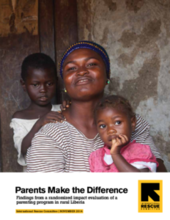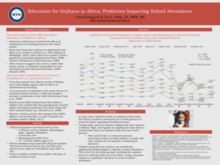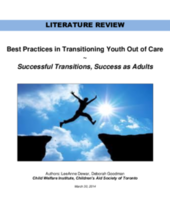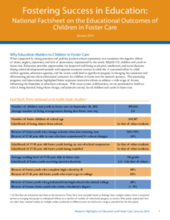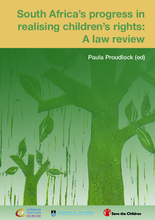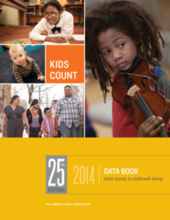Displaying 231 - 240 of 349
This report presents the findings from an evaluation of the “Parents Make a Difference” program, conducted by the International Rescue Committee and research partners at Duke University. The Parents Make a Difference program is an intervention that serves families in post-conflict, Lofa County, Liberia.
This leaflet is a mapping of Save the children’s role and work in promoting the engagement of fathers. It presents some of the evidence of the benefits of involving fathers and some of the strategies used by the organization and others.
This powerful chart illustrates preliminary research findings using data from Demographic and Health Surveys (DHS) in 5 African countries (Malawi, Mozambique, Niger, Uganda and Zimbabwe) to better understand how orphan status affects the school attendance of children in Africa and the extent to which living in kinship care can act as a protective factor in this context.
This issue of the US-based journal Future of Children, entitled ‘Helping Parents, Helping Children: Two-Generation Mechanisms,’ reviews intervention programs for children and families of low socioeconomic status and on the mechanisms of child development that those intervention programs are trying to influence.
This narrated interactive feature presents a logic model showing how policies and programs that strengthen specific kinds of caregiver and community capacities can build the foundations of healthy development.
This literature review examines literature on the best practices for youth aging out of care that indicate successful outcomes for them as adults.
The Kinnected program, developed by the Australian Christian Churches International (ACCI), is working toward the reduction of use of residential care of children and aims to assist children within the context of their families. This document provides an outline of the program and an overview of the lessons learnt.
This report from the National Working Group on Foster Care and Education provides statistical and demographic data on the education of children in foster care in the United States and highlights promising programs around the country that promote positive educational outcomes for children in foster care.
This book focuses on, and reviews, a selection of laws related to the rights of children in South Africa.
The KidsCount Data Book for 2014 is produced by the Annie E. Casey Foundation. It is the 25th edition of this data book, which measures state trends and demographics in child wellbeing in the United States.

